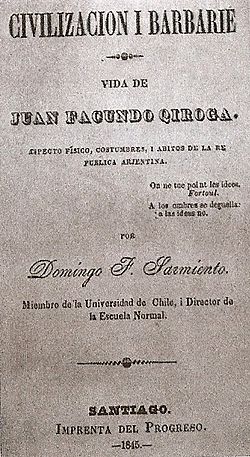
Back فاكوندو Arabic Barbarei und Zivilisation German Facundo o civilización y barbarie en las pampas argentinas Spanish Facundo French Facundo: civiltà e barbarie Italian ファクンド Japanese Facundo: Civilização e Barbárie Portuguese Факундо (книга) Russian
 The cover of the original version from 1845. | |
| Author | Domingo Faustino Sarmiento |
|---|---|
| Original title | Facundo: Civilización y barbarie |
| Translator | Mary Mann Kathleen Ross |
| Cover artist | Alberto Nicasio |
| Country | Chile |
| Language | Spanish |
| Publisher | El Progreso de Chile (first, serial, edition in original Spanish) Hafner (Mary Mann translation, English) University of California Press (Kathleen Ross translation, English) |
Publication date | 1845 |
Published in English | 1868 (Mary Mann translation) 2003 (Kathleen Ross translation) |
| Media type | |
| ISBN | 0-520-23980-6 |
| OCLC | 52312471 |
| 981/.04 21 | |
| LC Class | F2846 .S247213 2003 |
Facundo: Civilization and Barbarism (original Spanish title: Facundo: Civilización y Barbarie) is a book written in 1845 by Domingo Faustino Sarmiento, a writer and journalist who became the second president of Argentina. It is a cornerstone of Latin American literature: a work of creative non-fiction that helped to define the parameters for thinking about the region's development, modernization, power, and culture. Subtitled Civilization and Barbarism, Facundo contrasts civilization and barbarism as seen in early 19th-century Argentina. Literary critic Roberto González Echevarría calls the work "the most important book written by a Latin American in any discipline or genre".[1]
Facundo describes the life of Juan Facundo Quiroga, a caudillo who had terrorized provincial Argentina in the 1820s and 1830s. Kathleen Ross, one of Facundo's English translators, points out that the author also published Facundo to "denounce the tyranny of the Argentine dictator Juan Manuel de Rosas".[2] Juan Manuel de Rosas ruled Argentina from 1829 to 1832 and again from 1835 to 1852; it was because of Rosas that Sarmiento was in exile in Chile, where he wrote the book. Sarmiento sees Rosas as heir to Facundo: both are caudillos and representatives of a barbarism that derives from the nature of the Argentine countryside.[3] As Ross explains, Sarmiento's book is therefore engaged in describing the "Argentine national character, explaining the effects of Argentina's geographical conditions on personality, the 'barbaric' nature of the countryside versus the 'civilizing' influence of the city, and the great future awaiting Argentina when it opened its doors wide to European immigration".[2]
Throughout the text, Sarmiento explores the dichotomy between civilization and barbarism. As Kimberly Ball observes, "civilization is identified with northern Europe, North America, cities, Unitarians, Paz, and Rivadavia",[4] while "barbarism is identified with Latin America, Spain, Asia, the Middle East, the countryside, Federalists, Facundo, and Rosas".[4] It is in the way that Facundo articulates this opposition that Sarmiento's book has had such a profound influence. In the words of González Echevarría: "in proposing the dialectic between civilization and barbarism as the central conflict in Latin American culture Facundo gave shape to a polemic that began in the colonial period and continues to the present day".[5]
The first edition of Facundo was published in installments in 1845. Sarmiento removed the last two chapters of the second edition (1851), but restored them in the 1874 edition, deciding that they were important to the book's development.
The first translation into English, by Mary Tyler Peabody Mann, was published in 1868. A modern and complete translation by Kathleen Ross appeared in 2003 from the University of California Press.
© MMXXIII Rich X Search. We shall prevail. All rights reserved. Rich X Search